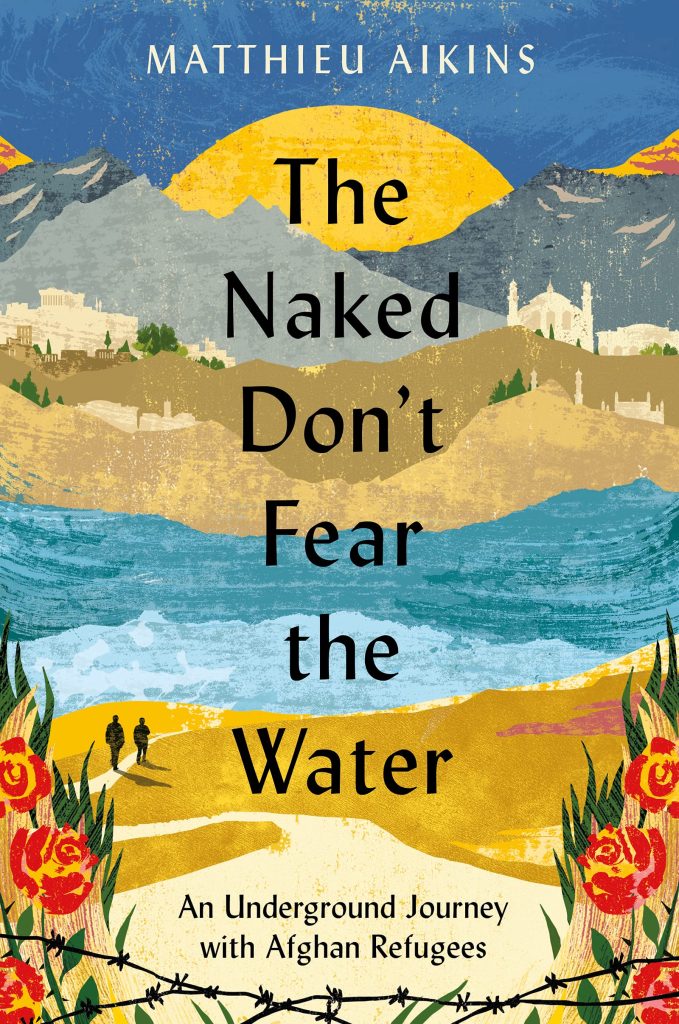FEATURE ARTICLE -
Issue 101: September 2025, Reviews and the Arts
Author: Matthieu AikinsPublisher: Fitzcarraldo Editions (by arrangement with Harper)Reviewer: Stephen Keim
The title of The Naked Don’t Fear the Water (“Fear the Water”) also provides the epigraph of the book. The epigraph advises that “the naked don’t fear the water” comprises an old Dari proverb. Dari is the form of the Persian language spoken in Afghanistan.
Fear the Water is the product of Aikins’ decision in October 2015, to join his Afghani friend and translator and fixer, Omar, on the smuggler’s road to Europe with Aikins’ travelling without his Canadian travel documentation and posing as an Afghani refugee. The journey commenced in 2016 and lasted a year. Both the first edition (Harper) and the second edition (Fitzcarraldo Editions) of Fear the Water were published in 2022.
In 2022, Aikins won the Pulitzer Prize for International Reporting as part of a New York Times team that investigated civilian casualties from US airstrikes in Afghanistan, Iraq and Syria. He was also a finalist in the same category in the same year for a cover story for the New York Times Magazine on the fall of Kabul to the Taliban. In 2025, Aikins won his second Pulitzer Prize, on this occasion, for Explanatory Reporting, for “an authoritative examination of how the United States sowed the seeds of its own failure in Afghanistan, primarily, by supporting murderous militia that drove civilians to the Taliban”.
Aikins had travelled overland from Uzbekistan to Afghanistan in 2008 and commenced a career reporting from the region. This gave plenty of time for his friendship with Omar and his family to develop.
Aikins’ ancestors came from Japan and Europe. But he looks uncannily Afghan. As his Persian improved, he was continually mistaken by border guards and other officials as being Afghani and, just as often, assumed, as a local, to be involved in some illegal smuggling activity. This combination of circumstances clearly added credence to the idea that he could pose as a refugee on the overland route to Europe.
The first quarter of Fear the Water provides background to the proposed journey by retelling aspects of Aikins’ 8 years of reporting from Kabul and other parts of Afghanistan including the background to stories he had published in Canadian and American outlets and which had won him journalism prizes. From these descriptions, the reader also gets a picture of the foreign journalist’s dependence on his translator and a particularly intimate picture of Omar’s contribution to Aikins’ success as a journalist in Afghanistan. One also experiences the nature of life and social life in Kabul during the years between when the Taliban abandoned the city to American backed armed factions and when the Americans abandoned the country to the Taliban’s second coming.
Aikins also provides a detailed background of Omar and his family and Omar’s experiences and hopes and dreams, growing up. The reader also is introduced to the passionate, reciprocated but non family-approved love affair between Omar and Laila. There is a contradiction between Omar’s desire to obtain Laila’s family’s approval and his desire to find a new life in the west but he is hopeful that both objectives can be obtained. This intense romantic interest story never quite leaves the pages of Fear the Water.
Part II, The Road, commences after 90 pages. The original plan had been for Omar to obtain a visa for entry into Turkey. Upon a coup occurring in Turkey, all such visas were put on hold and there was no option available other than the overland route across the land border with Iran and then over the mountains into Turkey. The latter part of the journey involved travel on foot. The land route would take at least two weeks and was exceedingly dangerous.
The Road chroniclesOmar and Aikins’ experiences on the land route to Turkey. They are together for the early part of the journey but are separated. Fear the Water narrates the experiences of both men. It also provides a sociological and political history of asylum seeking, generally, including the impact of political changes in a country or the world on the numbers of asylum seekers and the nature of their experiences. The end notes are extremely informative about this history and the politics and sociology that surrounds it.
The journey, as experienced, was as dangerous and arduous as was anticipated. This reviewer took comfort at times in the apparent fact that, since Aikins was writing the book, he must have survived.
Part III is entitled The Camp and refers to life in the refugee camp on the Greek island of Lesbos where refugees are detained for long periods of time with no apparent legal pathway to other parts of Europe. Part IV, The City, refers to life in a grotty suburb of Athens with a similarly very restricted set of prospects of getting to parts of Europe where one does have prospects of being granted asylum and, eventually, a pathway to legal residence and even citizenship.
Aikins got to Turkey. His boat trip across to Lesbos and Greek maritime territory may have been a lot shorter but was just as dangerous and harrowing as the land journey. The time spent by refugees in Moria refugee camp and in Athens are studies in heart breaking frustration and numbing boredom.
Aikins provides the same level of political, historical and sociological analysis in the subsequent parts of the journey as he did for the overland section, discussed above. He describes in detail the finding, on 3 September 2015, of the body of toddler, Alan Kurdi, on the Lesbos shore and the social impact of that event as photographs of Alan’s body appeared on front pages across Europe and the world.
Aikins also describes the political circumstances and forces that operated in Greece which allowed the suburb of Exarcheia to become an anarchist stronghold and no go zone for police and, thereby, allowed various groups and collectives to come together to support refugees with food and accommodation and other services all on the basis of everybody chipping in to help run the place. This provided Aikins with a zone of safety until the next part of the journey could be arranged.
Fear the Water is an astonishing piece of journalism. It is also an astonishing piece of political and sociological writing. Seven years ensued from when the trip was envisaged until publication. Even though Aikins came to his task with the knowledge and experience derived from seven years of reporting in Kabul, when he arrived safely to the end of that journey, he engaged in a gargantuan research project to provide the necessary context to what he and his fellow travellers had experienced and he had observed.
It is not at all surprising that Aikins has won two Pulitzer Prizes and been short listed for a third. His style of reporting constitutes the best and bravest form of journalism. As the world seems to be disappearing into untold horrors that peel the illusions from our eyes that, for many decades, we had preserved, it is almost trite to say that we would be much better off with many more Mathieu Aikins to inform us and many less of the hacks who serve up most of the contents provided by our legacy media.
https://www.facebook.com/watch/?v=10102990425066801



